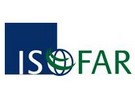ISOFAR co-organised the 1st EU/North-African conference on organic agriculture (EU-NACOA), with 140 participants. The venue was Marrakesh, Morocco during November 11-12, 2019. Tunisia is to host the second conference in 2020.
The Conference was declared open by Dr. Faouzi Bekkaoui (Director of INRA).
The conference described the status of organic production in North Africa and Morocco, where the umbrella-organisation FIMABIO is an important actor, coordinating producers, processors and distributors of organic products. Organic production in Morocco is aimed at exports (argan oil, olives, tomatoes etc.), and organic products are hardly available in the domestic market. From the science side, however, activity is high to solve problems and challenges related to organic production. Information was given about regulations, such as changes in the recently revised EU regulation of relevance for countries exporting to EU presented by Gerold Rahmann (ISOFAR President).
On day 2, especially plant protection strategies to control insects and nematodes were focussed, with a range of interesting presentations. Nematodes is a serious problem in many vegetable crops, and research is conducted both to develop methods to control them (e.g. ozone solubilised in irrigation water for tomatoes), and to acquire more basic knowledge about their distribution in different soil types and how this is related to various physiochemical conditions such as soil texture and organic matter. However, nematodes are not exclusively negative since they may be a good indicator of soil quality, and also may provide available Nitrogen to crop plants via feeding on soil bacteria. Interesting presentations were also given from Algeria, where growing conditions may be even more challenging than in Morocco – pictures were shown of tomatoes grown in Sahara, and how to repel a leaf miner insect by making extract of a common Euphorbia-weed. The status of the organic sector in Tunisia, where the government has since long given a significant support, was also presented, by ISOFAR board member Khaled Sassi who is Director of the National Technical Centre for Organic Agriculture in Tunisia.
With the headline of the conference being “Bridging the gap, empowering organic Africa”, several speakers were invited from countries outside North-Africa, to present relevant knowledge and results. The regulation and certification system of organic production in the United States was presented by Jessica Shade (ISOFAR board member). Also other members of ISOFAR board made relevant presentations on food quality (Eva Rembialkowska), the P status of organically managed soil (Anne-Kristin Løes) and effect of organic amendments on soil fertility and the production of organic green bean (Khalid Azim).
Victor Olowe presented preliminary results of a field experiment with various oil seed crops in Nigeria, which will go over 5 years.
Very many young students were present, sharing their results of Masters- or PhD-work in posters and presentations, and actively taking part in the discussion. Their excellent results and presentations give hope to a fruitful development of organic agriculture in Morocco.
On the last day, the participants were offered a tour to a diverse agroecological farm, and the ISOFAR board members to a farm with organic olives. Mostly foreign participants used this possibility to see somewhat more of the country.
For more information: ISOFAR
ISOFAR
Trenthorst 32
23847 Trenthorst
Germany
info@isofar.org
www.isofar.org
